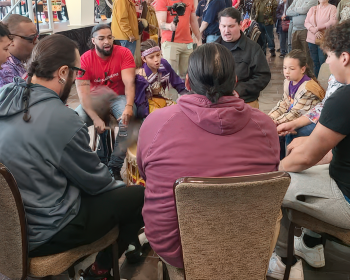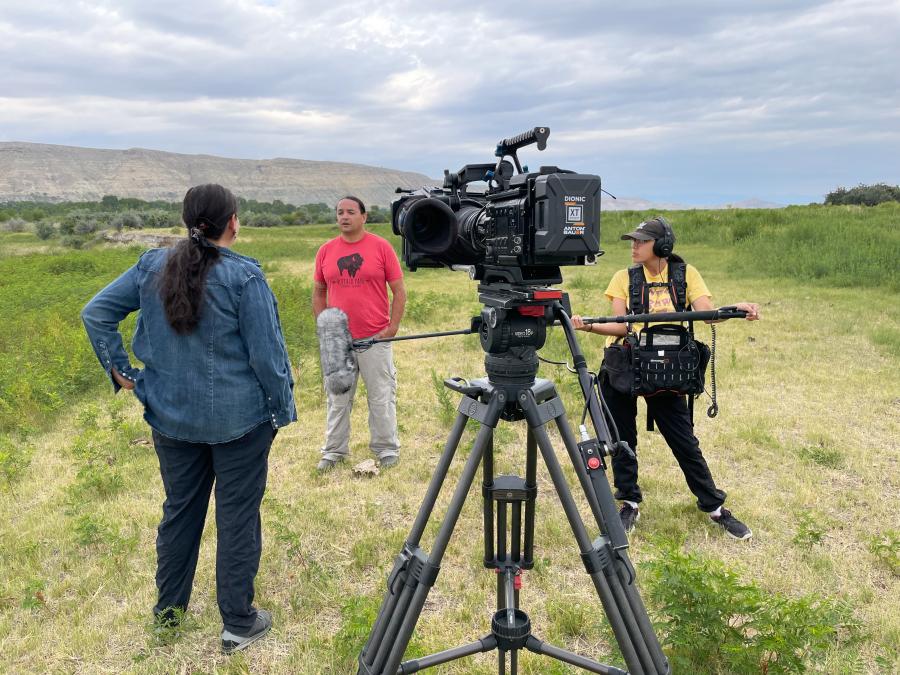Ordinary discourse in Gwich'in Athabascan communities frequently includes the word `subsistence,' but the word itself does not accurately describe most of their social behavior. Activities which also fall into this realm are sharing and trading networks, gift exchanges, and life event celebrations. All of these are linked with hunting, fishing, and harvesting plant materials. Because of the deleterious impact of colonialism on traditional customs, there are few remaining traditional devices to maintain mutual respect of each other. However, the traditional subsistence economy in a Gwich'in community is one of the cultural tools which continue to ameliorate social injuries successfully
Sharing game meat and reciprocity are the best mechanisms in this region for soothing damaged relationships. For instance, late one February night in 1993, well after sport hunting season was closed, a Gwich'in man on a snow machine pulled up to his sister-in-law's house (where I was living as well). The trailer behind his machine was laden with freshly killed moose meat. He brought one large section of it into her house. His sister-in-law hummed as she cleaned and cut the section into four or five smaller pieces while the hunter chatted with his brother-in-law. She put some of the meat into a pan to cook, wrapped the rest, and then her husband threw the wrapped parcels onto the roof of the house where her dogs could not reach it and where it would freeze. She was normally very critical of her brother-in-law, however, on this occasion, she chatted pleasantly with him instead of treating him with her more usual silent contempt.
Hunting in Alaska is enshrouded with regulations that fuel tensions between the state and federal governments over which controls the resources. Federal subsistence hunting regulations permit rural hunters to hunt on designated federal lands. However, Gwich'in hunters hunt year round and are mindful of the presence of state and federal game wardens. Some Gwich'in get official subsistence hunting permits; others proclaim their independence of such rules and refuse. Gwich'in hunters are discrete about what time of day and year they hunt. They follow traditional laws about harvesting the entire animal and sharing the meat within their sharing networks.
Traditional Gwich'in Sharing Customs
The Gwich'in local economy is founded on a principle of sharing food and other goods within social circles. Besides serving to keep all people at the same social and economic level, the sharing process is akin to the process underlying Gwich'in leadership and decision-making customs. Each traditional hunter learns to distribute his or her harvest to specific individuals and always includes at least one related elder. Close kin receive most of the meat, fish, and other resources and assist in their preparation. For example, the senior active member of a hunter's sharing network (usually a woman), receives the moose head and is expected to skin it and prepare the brains, eyes, tongue, and nose in a prescribed way.
Likewise, hunting trips often involve the entire family in the fall. Hunting entails following wildlife by boat or all-terrain vehicles, as well as labor to cut the meat and haul it back to town. Moose weigh between 800 and 1,200 pounds and they try to transport all parts of the animals -- not an easy task.
Some hunters maintain the avunculate custom of teaching a younger male relative how and where to hunt. Gwich'in men are rarely rewarded by their family or friends for jobs well done in the office or other mainstream employment and are encouraged to go hunting through their social networks. Some young Gwich'in men are given first kill potlatches as a traditional way of marking a level of manhood. Some of such potlatches are public or publicized. Other potlatches have been masqueraded as something else and when I lived in Gwichyaa Zhee, I learned how these alien regulations can disrupt cultural traditions.
A nine year-old Gwich'in boy had killed his first moose in June. However, state and federal regulations prohibit hunting moose during June. His parents told him that he would have a potlatch in the fall during official hunting season. Since his birthday was also in the fall, they used his birthday as the logical opportunity. I attended the potlatch/birthday party and was admonished before I arrived not to mention the moose; in fact, no one mentioned it. By swearing everyone to secrecy about the out-of-season moose, the masqueraded potlatch also added to the way Gwich'in people reinforce their boundaries against outsiders.
Subsistence Life in a World of Cash
Understanding cash in Gwich'in involves decoding a variety of cultural systems which are connected to cash. The traditional Gwich'in economy of sharing networks and trading alliances works against mainstream capitalism and emphasis on profit. Women maintain sharing networks through gossip circles, marketing networks, educational facilities, kin, and in public service spectra. Men maintain sharing networks through gossip circles, business partnerships public service entities, and to a lesser extent than women, educational facilities.
The Gwich'in traditional trading partner system or chitlii does not function in the cash-based economy which neutralizes communication through the dollar. The intricate political and social nuances signaled in gift-giving and other chitlii expectations are not possible or needed at the cash register. Through the chitlii, Gwich'in make declarations of war, send conspiracy messages, arrange marriages, and trade goods and services with each other.
The dollar represents a completely different, but interrelated set of symbols. Despite occasional complaints about cash as a device which has degraded traditional culture, the Gwich'in use and seek cash constantly and only rarely offer something as trade or barter. Teachers, missionaries, government agents, and researchers have taught the Gwich'in many of the activities, politeness, behaviors, and connections which involve cash transactions. To the extent that Gwich'in individuals involve themselves in the many different possibilities of global cash transactions, these instructions have been useful. While cash as a means of trade has entered Gwich'in communities, other aspects of mainstream economics, such as the profit motive are not part of Gwich'in culture. On the contrary, Gwich'in sharing values counteract mainstream ideals of accumulation.
People in Gwich'in villages can live with less cash than they can in urban centers. Continually implementing sharing networks and supporting behavioral codes allow men and women to avoid total reliance on cash. Moreover, Gwich'in subsistence traditions encourage partial employment rather than full time jobs. Men, rather than women, are socially rewarded for maintaining a hunting lifestyle in the subsistence economy. Gwich'in politeness codes encourage silence, and their hunting skills require solitude. Both are habits which are rewarded in the intimacy of Gwich'in homes. One consequence of all of these factors is that people often take jobs only for as long as they need the money and do not think of them as career opportunities. There are some jobs that are filled repeatedly throughout the year by transitional workers. There are also a few individuals whose competency is so effective that they are encouraged to remain focused on the cash culture rather than on traditional village activities despite their personal wishes.
One complexity of the present Gwich'in economic system is the multi-faceted ethical codes and social poetics. The ethical rules of reciprocity in the village and in mainstream society differ and, to a certain extent, are mutually incompatible. In the villages, a sharing network implies a vague debt for the recipient. Such an open-ended system of sharing and caring is common to many small communities. Even more important than the gestures linked with each exchange is the very fabric of sharing as an interpretive action.
Outsiders often assume that Gwich'in have assimilated into mainstream society if they conduct any business involving cash. Indeed, many Gwich'in people might believe this themselves. However, it takes full awareness of cash or reciprocity to be competent in either economy In 150 years, the Gwich'in have not yet become fully part of the world's cash system, but they have been consumed by the addictive aspects of capitalism which has undermined their traditional economies. The pressures of capitalism and the almighty dollar work against Gwich'in efforts to achieve economic independence. Achieving independence will also entail more intense protection of their final resource -- themselves.
References
Anaya, S. James. 1989. "The Rights of Indigenous Peoples and International Law in Historical and Contemporary Perspective." Harvard Indian Law Symposium. Cambridge: President and Fellows of Harvard College. pp. 191-225.
Berger, Thomas R. 1987, "Native Rights Movements." Cultural Survival Quarterly. v. 11(1):13
_____. 1985. Village Journey: the Report of the Alaska Native Review Commission. New York: Hill and Wang.
Childers, Robert A. 1994. "Cultural Protection: a Link to Tradition." Forum for Applied Research and Public Policy. 9(4):79-83.
Christian, Jane and Peter M. Gardner, 1977. "The Individual in Northern Dene Thought and Communication: a Sharing and Diversity." Canadian Ethnology Service Paper No. 35. Ottawa: National Museum of Man, Mercury Series.
Mishler, Craig. 1995. Neerihiinjik: We Traveled from Place to Place, Johnny Sarah Haa Googwandak (the Gwich'in stories; of Johnny and Sarah Frank). Fairbanks: Alaska Native Language Center.
_____. forthcoming. Born with the River: An Ethnography and Ethnohistory of Alaska's Big Delta/Goodpaster Indians. Anchorage: Alaska Department of Natural Resources, Div. of Geological and Geophysical Surveys.
Slobodin, Richard. "The Subarctic." Kutchin. Handbook of North American Indians. June Helm, ed. Washington, D.C. Smithsonian Institution.
Article copyright Cultural Survival, Inc.


